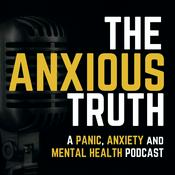When you have an anxiety disorder, it can feel like your list of fears and triggers just keeps getting longer. You might have started being afraid of one or two things, but now it seems like everything sets you off. Driving, being home alone, intrusive thoughts, physical sensations, even opening a new bottle of medication.
Despite what it feels like, you're actually only afraid of one thing.
All those different triggers lead to the same place, no matter how varied they seem. Whether it's a health worry, a fear of losing control, or an intrusive thought, they all create the same internal experience. Your heart races, your body floods with adrenaline, and you feel overwhelmed by fear and discomfort. You've learned to fear how you feel, and those feelings trick you into believing your thoughts must be accurate.
This is different from regular anxiety, where people worry about external things happening in their lives. In an anxiety disorder, the internal experience becomes the problem.
Understanding this might be helpful because it means you don't have to tackle 35 different fears one by one. You're working on one thing: learning to be okay with uncomfortable internal experiences, even when they feel terrible. You're experiencing real fear, but you're not in real danger.
I talk about why this happens, how it keeps you stuck, and what you can do about it.
As always, this episode contains suggestions based on acceptance and mindfulness approaches that may be helpful in your recovery journey. I'm not promising fixes or cures, just offering a different way to think about what you're experiencing.
For full show notes on this episode:
https://theanxioustruth.com/335
The Disordered Podcast (weekly with me and Josh Fletcher)
https://disordered.fm
Send in a question or comment via text.
Support The Anxious Truth: If you find the podcast helpful and want to support my work, you can buy me a coffee. Other ways to support my work like buying a book or signing up for a low cost workshop can be found on my website. None of this is never required, but always appreciated!
Interested in doing therapy with me? For more information on working with me directly to overcome your anxiety, follow this link.
Disclaimer: The Anxious Truth is not therapy or a replacement for therapy. Listening to The Anxious Truth does not create a therapeutic relationship between you and the host or guests of the podcast. Information here is provided for psychoeducational purposes. As always, when you have questions about your own well-being, please consult your mental health and/or medical care providers. If you are having a mental health crisis, always reach out immediately for in-person help.



